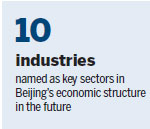Demo bases, platforms launched to foster growth
To enhance the capital's innovation-driven economic development, Beijing launched a series of business demonstration platforms and bases in February.
A total of 35 small and medium-sized public service companies will demonstrate the new business development platform, rolled out across the city.
A further 35 microenterprises will act as new demonstration bases to help further their innovation capabilities.
The demonstration platforms and bases are expected to play a leading role in improving business services, gathering industrial resources and sharing information channels, as well as improving operating management and enhancing innovation development, according to officials at the Beijing Commission of Economy and Information Technology.
The first 35 demonstration platforms focus on financing, startups, information, management consulting and training services. They are located in eight districts of Beijing, 16 of them are in Haidian district and six in Chaoyang district.

The 35 demonstration bases are spread across nine districts in Beijing, covering intelligent hardware, biopharmaceuticals, electronic information and intelligent manufacturing sectors. Of them, 16 demonstration bases are located in Haidian district and five are in Changping district.
Under the national strategy of the Beijing-Tianjin-Hebei province integrated development, the capital will focus on developing 10 tech-intensive industries, including information technology, integrated circuits, medicine and healthcare, intelligent manufacturing, new energy vehicles, new materials and artificial intelligence, which coincide with the development plans of the demonstration bases.
Zhao Hong, vice-president of the Beijing Academy of Social Sciences and president of the Zhongguancun Research Institute for Innovation and Development, said that the bases and platforms highlight areas of specialism in different districts of the city.
"Zhongguancun Science Park, the Chinese Academy of Sciences and Peking University in Haidian district have an innovative atmosphere and research and development capacity at an international level," Zhao said.
"Beijing has explored an innovative service model for several years and formed its own characteristics in the service industry. Professional services can better meet the demands of innovative startups and promote SMEs' development," he added.
Official statistics show that 6 million to 7 million small and microenterprises are set up nationwide each year, and the number is expected to increase.
Li Peng, vice-president of Nash Work, a shared workspace startup in Beijing, said: "Releasing the names of companies that have won honors in the demonstration platforms and bases is one of the important government measures in supporting the development of SMEs.
"SMEs should follow the government's policies, information and strategic plan to gain more development space."
caoyingying@chinadaily.com.cn
(China Daily 04/02/2018 page10)














